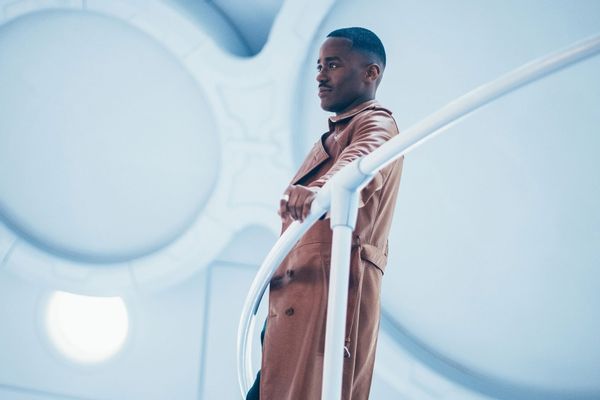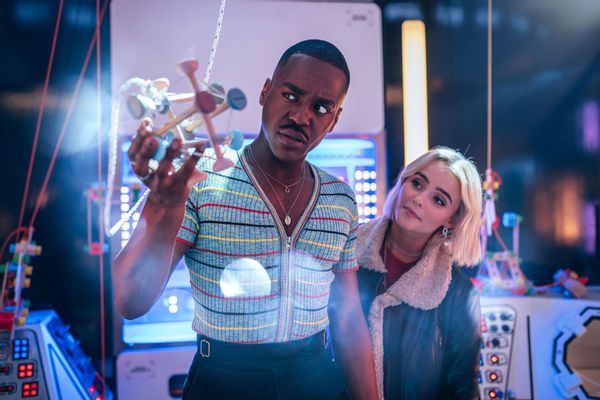
“Doctor Who” producer Russell T. Davies marvels at the fact that 25 years ago he was barely blinked at for casting three white heterosexual men as the leads of his groundbreaking series “Queer as Folk.” The premise itself, he reminded me in a recent Zoom conversation, was considered “radical, wild and new.”
Not long after its debut, he recalls being confronted in a Manchester club by a gay actor who demanded to know why Davies didn’t cast him in the show. “And when I said, ‘Well, I don't know you. I don’t who you are,’ he went, ‘That’s the point.’”
“I’ve never forgotten that lesson, standing there at two in the morning on the dance floor in Manchester,” Davies added. Casting Ncuti Gatwa as the 15th incarnation of The Doctor is proof. But so is the existence of Captain Jack Harkness, one of the best-loved characters in the Whoniverse, who happens to be openly bisexual.
Gatwa’s Doctor is sexually fluid too, dropping a line about sharing a “long, hot summer with Harry Houdini” during his Time Lord’s first Christmas special, which also introduces his first companion Ruby Sunday (Millie Gibson). They bond over being orphans, alone together in the universe but also blessed with accepting, chosen families – hers living throughout the U.K., his flung across time and space.
The trait that draws them together more fiercely is their appreciation of a good time regardless of the danger. Ruby’s taken with the 15th Doctor from the first sight of him giddily spinning on a nightclub’s dancefloor.
Was that an intentional echo from Davies’ past, perhaps answering that man’s question all the years? I’m embarrassed to admit I didn’t think to ask that after he shared that anecdote. What’s certain is that he means it when he said, “I learned from my own stuff, and from talking to people. I do listen.”
Gatwa’s announcement as Fifteen was met with overwhelming elation compared to the balance of celebration and sexist trolling that exploded following Jodie Whittaker’s reveal as the 13th Doctor and the first woman to step into the role. This followed years of Davies’ predecessor Steven Moffat fending off questions about whether he’d take the bold step of breaking the line of white men who have played the role.
The answer was no; he left that job to Whittaker’s producer on “Broadchurch” Chris Chibnall who had no material experience with the franchise before taking the helm. Moffat worked under Davies through his “Doctor Who” renaissance, which hit its height during David Tennant's era between 2005 and 2010.
For many, Tennant set the bar for what The Doctor should be, establishing the character as a blend of action man and romantic hero whose love for his companion Rose Tyler (Billie Piper) broke and mended our hearts constantly.
Gatwa’s Doctor, meanwhile, is a swashbuckling being who prioritizes joy above all, which may catch the classic “Doctor Who” fandom off guard. Not so much by the delightfully odd “Space Babies” episode with its on-the-nose title and guest cast that’s still in diapers but the chromatic cheer of the whole thing.
Within the first three episodes starring Gatwa, Davies makes room for two broad song and dance numbers, introduces a supervillain played by “RuPaul’s Drag Race” royalty Jinkx Monsoon, and saturates sets with color. Add in the fact that Ruby’s adoptive family is Black, her mother has a girlfriend, and that the band Ruby plays in is fronted by a trans woman, and this may be the queerest era of the series yet.

But these characters note are just part of the world, not even subtext. Davies' focus during this second time around with the franchise, and his first working for and with Disney, is to prioritize the Doctor and Ruby’s pursuit of joy across the universe.
Good thing too, given the easy radiance of Gatwa’s smile and the ebullient spark with which his Time Lord moves through the universe. His predecessors had joie de vivre, especially Tennant and his successor Matt Smith, but Gatwa’s Doctor can find the fun in anything, including the snot trail left behind by a particularly grotesque monster.
"It’s a lot of work, joy. It's very hard to achieve on screen,” Davies said. “Anyone can cry in the rain. Sadness is comparatively easy: thunder, it rains, cry, that's all done. I believe in reaching and pushing for the greatest emotions that you can possibly get. Pushing towards joy . . . am I alone in that? I don’t think so, but there's not many doing that.”
Especially in sci-fi and fantasy. Speculative TV and film plots in the modern age are ruled by dystopian themes or drumbeat buildup toward massive battles between dueling powers – maybe good versus evil, but usually competing forces representing a bit of both.
“Doctor Who,” in contrast, has always cast its Time Lord as the two-hearted man who rights wrongs and re-establishes balance. His main adversary in this chapter has yet to be revealed, but a recurring citation is the rule of fair play.
You might call these elementary ideas to which Davies would agree. Although the most vocal “Doctor Who” fans online tend to be middle-aged men, this is a family show above all. Hence Davies’ doubling down on that three-letter word dominating every episode.
“Joy, I think, is important. Life doesn’t. Life is terrible. The world is falling into hell. So I do think it's the very good role of fiction to find hope, to find some inspiration, to find the strength to push through and to say, ‘Actually, it can be alright,’ even if in the real world that's not happening.”
He adds, “And I speak as we re-enter the ‘Years and Years’ timeline. With the elections coming up in America, I'm terrified to join where we could have been in 2018.”

He’s referring to the miniseries he made after leaving “Doctor Who” – another time-traveling tale of a sort, only set on Earth and bound by gravity’s rules.
In “Years and Years,” Davies imagines what life would look like if the British government were to slide into authoritarianism from the perspective of a middle-class family he depicts in a series of five-year jumps. They weather climate disasters and political derangement well enough, although society’s deterioration is unignorable.
He received more acclaim for 2021’s “It’s a Sin,” a period piece spanning 1981 and 1991 and follows a group of friends living through the AIDS crisis. Dire as both of those series could be, Davies insisted on preserving a sense of jubilation in their characters’ endurance.
“So when you ask what I've learned from making those other shows, I mean, what you're describing is the way I write, really,” he tells me. He’s also aware of what it means to resume writing for “Doctor Who” in a darkly political and socially polarized time catalyzed in no small part by a social media cycle he calls toxic. “I’ve forgotten my Twitter password,” he darkly quips.
“Nevertheless, like you, we were rather delighted by the joy with which Ncuti was received. It was a phenomenal moment. But we're not daft. We know there are different voices out there as well,” he said.
Still, the welcoming response to Gatwa’s casting given his status as a relative newcomer — Netflix’s “Sex Education” was his TV breakout – made Davies ponder the nature of our cultural rifts more closely.
When we lament a fandom’s alleged resistance to inclusion, he asks, “Are we actually talking about society now? Or are we talking about a single platform that is very noisy? None of us knows the answer to that,” he said, “So it feels like we're having a conversation into an echoing box. Unless you lift your head, and then the world is very different. Or you have to hope that the world is very different.”
He continued, “So what do we do except keep on fighting? And I think it is a fight. I'm conscious of being part of it. It’s a tough old battle . . . but I simply will not back down.”
Davies’ means of fighting the good fight is to preserve the gleefulness in the message. Take “Space Babies” as an example, an adorable space action episode with a monster that rivals any horror movie. The reason the babies are in space, however, is one scenario of what could happen when a society strips people of their reproductive autonomy.
“The most important thing to remember about ‘Doctor Who’ is to have a good story. So I would never let [politics] hold up the telling of a great yarn,” Davies said, explaining that the point is for a six-year-old to watch these episodes and enjoy them with a blissful unawareness of any societal turbulence.
“Along with the writing has come over the years the responsibility to stand forward and speak for these rights, which is something others don’t like to do because they'd just like the work to speak for itself,” he added. “Nonetheless, as you can see, I can have a talk.”
His devotion to listening, though, might be what finally got a Black Doctor the keys to the TARDIS. But we shouldn’t downplay Gatwa’s all-conquering charisma, either – he was the last actor to read for the part.
“We auditioned people of color, white people, nonbinary people, women, every sexuality. We really went across the board,” Davies enthusiastically recalled, “and then he came in and stole it. He stole it.”
"Doctor Who" premieres with two new episodes Friday, May 10, at 4 p.m. PT/ 7 p.m. ET on Disney+.







